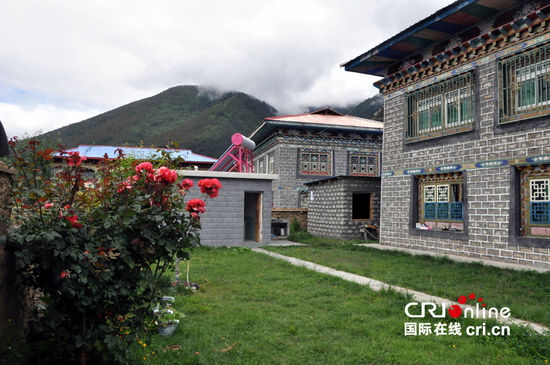"Internet Plus" to rid poverty

Darma and Lhamo, a Luoba ethnic couple living in Qionglin Village of Menling County, southwest China's Tibet Autonomous Region, are running a medium-size family inn.
In June of 2016, China Mobile offered broadband access to them. Since then, the couple began to use Internet for promoting, which brought an increase of over 10,000 yuan (about 1499.59 U.S. dollars) in income.
"Internet brings a lot of benefits to us. Previously, tourists did not choose to live in our inn because Internet was not available here. Nowadays, tourists prefer to living in here and help us promote our family inn with their Wechat and microblog," said by Darma.
In recent years, with the implementation of "Internet Plus" program and "broadband Tibet" strategy, Internet has covered Tibet's farming and pastoral areas. It increases not only the living standards of local farmers and herdsmen, but also the income by the integration of Internet and traditional industries involving tourism and catering industry.
Xue Waka Village of Pome County, Nyingchi of southwest China's Tibet Autonomous Region, is located along No. 318 State Highway. It is known for precious herbs such as cordyceps, gastrodia elata and glossy ganoderma. Previously, villagers always sold those herbs to businessmen who came to the village or to stores in the county at a low price. After setting up a comprehensive information service station, the local can promote and sell their herbs through the Internet, greatly increasing local farmers' income.
In the period of 12th Five-Year Plan, China Mobile has built 3,000 rural information service centers, covering 57 percent of all administrative villages and 62 percent population of farmers and herdsmen in Tibet. At the moment, this information platform will be developed into the "e-commerce" platform, aiming to let more farmers to learn and know about the outside world.
In 2014, Qionglin Village, Nanyi Town of Menling County, Nyingchi of southwest China's Tibet Autonomous Region, built a fiber-optic broadband offered by China Mobile for the first time. Currently, there are 47 households in the village, of which 40 have access to broadband. Wifi access is available in the village.
There are 15 family inns in Qionglin Village, greatly increasing local villagers' income. Since villagers had access to the Internet, per capita income of the local increases to 90,000 yuan (about 1,3496 U.S. dollars) from 60,000 yuan (about 8,997 U.S. dollars).
As of 2016, Tibet branch of China Mobile has already poured into 14.29 billion yuan (about 2.14 billion U.S. dollars) and built 12,600 base stations. The total length of long distance optical cable reached 51,900 sheet km. In Tibet, there are already 4,440 administrative villages that have access to mobile Internet, with the coverage rate of 84 percent. 693 towns and more than 4,000 administrative villages have access to the optical fiber cable, lying a solid foundation for the proliferation of optical fiber cable in all farming and pastoral areas.
Your Comment
Name E-mailRelated News
-
;
-
-

-
Poverty alleviation key for Tibet
"The region has set its goals for the next five years, which are to keep double-digit economic growth on an annual basis and the annual increase of fixed-asset investments to above 20 percent," said Ai Juntao, the secretary of the regional government.
-
-
-

-
Intangible cultural heritage becomes poverty alleviation tool in L
Ze Tier, or Tsethang wool serge, is a handmade textile art based on Tibetan Pulu, in which the warp and woof are gradually changed from coarse to fine and the texture from thick to thin.
-
-
-
Poverty alleviation contributes to ethnic unity
Yeshe Drolkar, a Tibetan female deputy was encouraged by Chinese Premier Li Keqiang’s resolution to fight against poverty announced in his first annual government work report on March 5.
-
Based in Lhasa, Tibet Vista is a Tibet travel agency that specialized in Tibet permit, and Tibet tours for both private and group travelers at a local price!
•4 Days Lhasa City Group Tour from USD 460 •8 Days Everest Base Camp Group Tour from USD 850 •15 Days Mt.Kailash Group Tour from USD 1780 •2016 Tibet Train Tours from Beijing, Shanghai, Chengdu, Xining,etc










